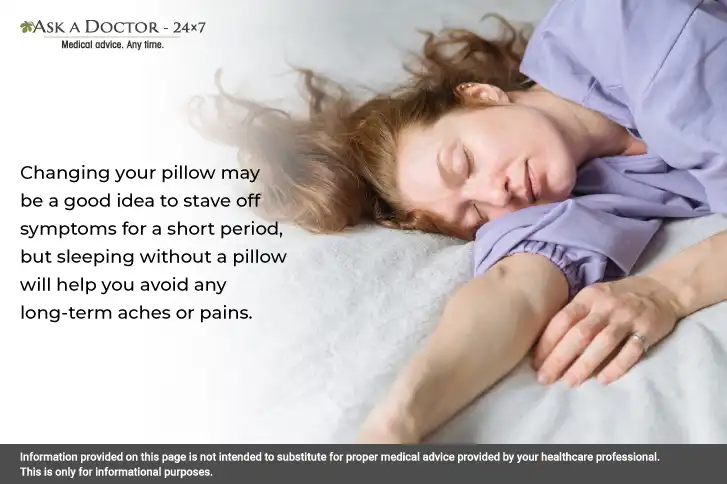5 Benefits Of Not Using A Pillow While Sleeping
Did you know that sleep specialists worldwide recommend avoiding pillows, as your pillow may do more harm than good? Yes, it's true. Indeed, sleeping without a pillow can improve your overall health and relieve various uneasy symptoms you may have been experiencing, like a stiff neck, headaches, and lower back pain. If you don’t use a pillow, it allows your body to rest in its natural position and helps your body eliminate a range of health issues. Let us read on together the top 5 benefits of not using a pillow while sleeping…
5 Benefits of Not Using a Pillow While Sleeping

Depending on personal preferences, one can sleep comfortably without a pillow. This will certainly not harm your body, and you can reap a lot of health benefits from it:
1. Helps Alleviate Neck Pain
The pillow you use should be able to keep your head in parallel alignment. However, most pillows fail to offer this support. Not only do they make your neck bend down or push upwards, but using them also results in lousy sleep postures. Sleeping without a pillow is the best way to alleviate back pain. Your head not only rests in the natural position, but it also prevents muscle strain and nerve damage.
2. Benefits Your Back and Spine
If you often experience aching body parts during the day, chances are your pillow is wreaking havoc with your body posture overnight. It’s possible the pillow you have been using isn’t providing adequate support for your head or is deforming the position of your spine and inducing back pain. Try to sleep one night without a pillow, as it greatly benefits your spine. Doing this allows your spine to rest with the body’s natural curves, and you’ll wake up feeling better the next morning.
3. Improves the Quality of Your Sleep
Some people keep adjusting their pillows constantly as they try to sleep, especially when using the wrong one. However, to let your body rest in an adequate position, you don’t need a pillow or any other neck and head support. Sleeping without a pillow ensures you have a good night’s sleep. As your body is not elevated, you stay comfortable, and your sleep isn’t disrupted.
4. Helps Prevent Wrinkles and Facial Acne
Sleeping with your face pressed onto the pillow surface for hours is not good for your skin's health. This results in the pores on your skin being denied access to air and leads to acne breakouts, the formation of blackheads, and other skin problems. Your skin is also exposed to oil and dirt, particularly if you do not wash/change your pillowcase every day. So, not using a pillow is a wise decision. Wrinkles might also be avoided by sleeping without a pillow. Consult a dermatologist or ask a doctor online for more information on how sleeping with a pillow can affect your skin.
5. Keeps Allergies at Bay
Did you know that difficulty in breathing, itchy eyes, or a runny nose could be possible signs of an allergy? You might have noticed that these symptoms are typically worse in the mornings and at night. This could be due to dust mites present in your pillow. Removing the pillow ensures that dust mites do not trigger your allergies.
Conclusion
Your sleep time is all about relaxing and must not be something that strains your muscles. So, you must remove anything that interrupts your sleep or doesn’t support your natural body posture. Your body won’t need to take the strain once you ditch the pillow. Initially, you may feel uncomfortable sleeping without a pillow, but once you start sleeping this way and settle in, it will certainly give good health benefits without any uneasiness. Even occasionally sleeping this way will benefit you, relieving spine and neck-related issues and other discomforts.
For more information, please Consult a Specialist online at Ask a Doctor 24x7.
Recently Answered Questions Related to Neck Pain and Pillow Use
- Suggest Treatment For Severe Pain In The Neck
- What Causes Sweaty Head At Night While Sleeping?
- I Am Suffering Sleep Paralysis With My Sleep Cycle
- What Causes Pressure In the Throat While Sleeping?
- Suggest Treatment For Sleep Talking, Sleep Walking And Nightmares
- Lack Of Sleep. Suggest Sleep Inducing Medication
- Muscle Freeze, Breathing Trouble After Waking From Sleep. Scared To Sleep. Sleep Paralysis?
- Is Sleep Study Required To Detect Sleep Apnea?
Disclaimer: Information provided on this page is not intended to substitute for proper medical advice provided by your healthcare professional. This is only for informational purposes.
Ask a Specialist
Recent Questions


